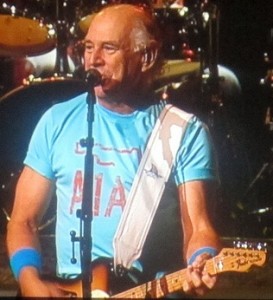 When last we met, I had begun talking about lessons in community engagement from, you remember, Jimmy Buffett. To refresh your memory, here are the last two paragraphs from that post:
When last we met, I had begun talking about lessons in community engagement from, you remember, Jimmy Buffett. To refresh your memory, here are the last two paragraphs from that post:
First and foremost, Jimmy Buffett appears to care deeply about his audience. He seems to genuinely like them. Now, I’m sure that’s not true every minute of every day of every fan, but on the whole he seems to enjoy singing for them–even when he’s singing Cheeseburger in Paradise for the gazillionth time. In concert there seems to be virtually no “distance” on his part. I’ve seen him stroll out alone, barefoot, onto the stage and begin a concert with an incredibly intimate song that sounds as if it’s being sung, individually, to each member of the (very large) audience.
I make this the first point because it trumps all. He likes to sing and he does what he does with excellence. But it is the care for his fans that comes through and it is this that forms the foundation for his success. What’s the lesson here? Imagine how our work would differ if we began from a perspective of caring deeply about the people we do (and more importantly, can) serve. We would imagine how our arts expertise could enrich, enhance, and improve their lives. To get there, we need to shift our focus from the art we hold so dear to the people whom that art can serve.
And here I continue:
Second, JB loves his work. He’d have to to perform so much for so many years. He would have to love to make music. He appears to be having a blast. But it is important to see that this is the second priority. If he simply loved to perform but didn’t care about the audience, the audience would soon (if not immediately) see that and, while they might enjoy the work for a while, they would not be devoted in the way that is responsible for his longevity and is the foundation of his financial empire.
This one is probably the easiest for us. We work in the arts because we love the arts and we love making the art that we make. (I do wonder, though, if enough artists are having fun doing what they do. There can be a bit of difference between loving to do something and having fun doing it.) But for the greatest success, it cannot be the love of making art that is primary. If the public, the audience, the community is a necessary evil to be endured for the sake of being able to do what we want to do, we will never achieve sustainable success–or at least not the level of success that should be possible.
Finally, Jimmy appears to be intent on the pursuit of excellence. Technically, his shows are tight. I am hard-pressed to remember a slip from him or his musical partners in the hours I’ve seen them all on stages. (Although I was not present the evening he fell off the stage in Sydney.) Yep, they’re professionals. And, as I said, there is a good deal of depth in many (though granted not all, by any means) of his songs. There is meaning to plumb on repeat visits to many of them, meaning that can enrich the lives of those who pay attention. I know that may seem a bit over the top, but I think this kind of content excellence is an essential part of any artistic longevity. I think the one additional point that may be important here is that the depth is designed to be accessible to that audience he loves. (See the first point again.)
There are no arts professionals I’ve ever met who were not concerned about excellence. So this, also, should not be difficult. The one bit of enhanced framing I’d like to add, though, is that the pursuit of excellence has at least one of its roots in respect for the audience. They deserve the excellence. It’s not simply excellence for its (or the performer/presenter’s) sake.
So, the pirate lessons for the arts establishment? In a nutshell, here goes:
- Care for the community, those whom you are serving with your art. This is the prime directive.
- Love your work, but don’t let this become more important than the people whom the art will inspire.
- Pursue (and achieve) excellence, not for its own sake but for the sake of your audience. They deserve it.
Granted, this is my first pass on the lessons from this pirate, but it seems to me to be a reasonable beginning. And, if you don’t believe that there is something of merit in any of this, look at that picture again. Is that the face, physique, (and hairline) of a multimillionaire rock and roll superstar/legend? There have to be some secrets worth exploring!
Engage!
Doug
Jimmy Buffett Photo:![]() Some rights reserved by Bruce Tuten
Some rights reserved by Bruce Tuten
